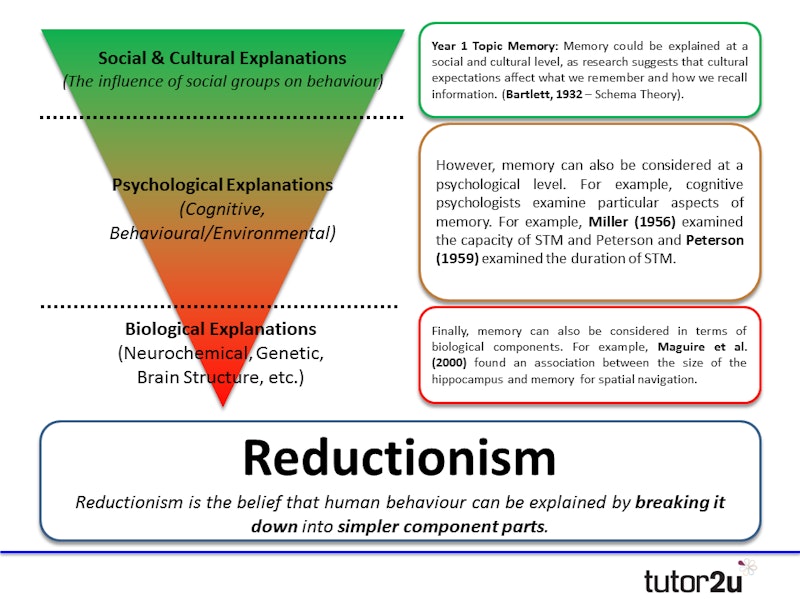Study Notes
Issues & Debates: Reductionism & Levels of Explanation
- Level:
- A-Level
- Board:
- AQA, OCR
Last updated 22 Mar 2021
Reductionism is the belief that human behaviour can be explained by breaking it down into simpler component parts. Those who take a reductionist position believe that the best way to understand behaviour is to look closely at the parts that make up our systems, and then use the simplest explanations to understand how they work. Reductionism is based on the scientific assumption of parsimony: the idea that complex phenomena should be explained in the simplest terms possible.
Parsimony is similar to the idea of Occam’s Razor, which was established by William of Ockham in the 14th century. Like parsimony, this theory states that one should not make unnecessary assumptions and that the answer to a problem is often the simplest.
The reductionist approach suggests that there are different levels of explanation. The lowest level considers physiological (biological) explanations, where behaviour is explained in terms of neurochemicals, genes and brain structure; the middle level considers psychological explanations (e.g. cognitive and behavioural) and the highest level considers social and cultural explanations, where behaviour is explained in terms of the influence of social groups.
Any behaviour can be explained using these levels, and this idea is best illustrated with an example.

Year 2 Optional Topic Aggression: Aggression can be explained at a biological level in terms of hormones (e.g. testosterone) or brain structure (e.g. the amygdala); at a psychological level through either operant conditioning or observation and imitation (social learning). Furthermore, it could also be explained in terms of cultural norms and expectations. This was illustrated by Souweidane and Huesmann (1999), who found that Detroit High School children who had been born in the United States were more accepting of aggression than children who had emigrated from the Middle East, especially if they did so after the age of 11.
Extension: An Interactionist Approach
An interactionist approach argues that several levels of explanation are necessary to explain a particular behaviour, ranging from lower (biological) to higher levels (social and cultural). Interactionism is subtly different to holism (see below), as interactionism considers how different levels of explanation interact, whereas holism is more concerend with understanding the whole experience, rather than individual explanations.
Teacher Resources
-
Issues & Debates Full Topic PowerPoints for AQA A Level Psychology
Digital Resource
-

Issues & Debates Topic Worksheets for AQA A Level Psychology
Digital Resource
For More Study Notes
To keep up-to-date with the tutor2u Psychology team, follow us on Twitter @tutor2uPsych, Facebook AQA / OCR / Edexcel / Student or subscribe to the Psychology Daily Digest and get new content delivered to your inbox!
You might also like
Psychology Weekly Update
8th January 2017
Issues & Debates "Flashcard Focus" Activity
Quizzes & Activities
Issues & Debates Summary | Classroom Poster / Student Handout Set
Poster / Student Handout
Behaviourist Approach
Quizzes & Activities
Biological Approach
Quizzes & Activities